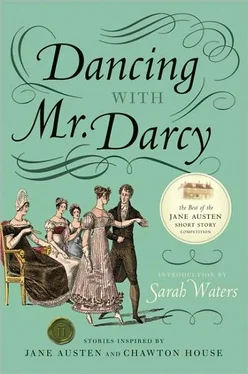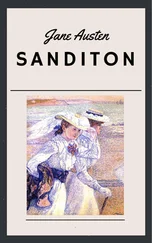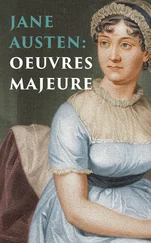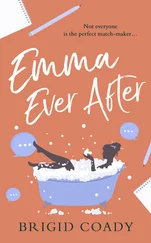At that moment, a slight figure, gripped by a stocky, pugnacious man, could be seen approaching the house from the direction of the chapel.
‘Good God! Miss Eyre’s back from the doomed wedding already with Edward. I must return to the third storey,’ exclaimed Bertha Antoinette. She started to rip at her clothes and pulled her black hair into disarray as she ran back into the house. The fire alarm stopped. Grace Poole hastily stamped out her cigarette and followed her.
Mrs Fairfax said to Hannah, ‘In eight minutes, Miss Eyre will withdraw to her own room. You may be able to speak with her briefly until Mr Rochester arrives. He will sit outside her door before he makes his inappropriate offer of sinful living.’
Hannah knocked on Miss Eyre’s door.
‘Ed?’ exclaimed a voice in surprise.
Hannah entered, ‘No, it’s me, Hannah Peel. I’ve come on a CAST placement. I know it’s not a great time but—’
‘Come in, Miss Peel. I thought it strange that Ed should be knocking at the door. I usually stumble over him sitting in a chair across my threshold, some time in the afternoon.’
‘Have I disturbed you getting undressed?’ asked Hannah, who saw a square, blond veil on the bed.
‘I need to take off my gown mechanically and put on my stuff dress from yesterday. But I have all morning to do that. Miss Peel, are you certain that you are to shadow me?’
‘Yes,’ said Hannah.
‘But you are very beautiful. Even more magnificent than Miss Ingram. And I am small and plain.’
‘What! Are you kidding me? Your look is so right now. Slight, boyish figure, elfin. You might even be a size zero. And your skin is clear, hair in great condition and a versatile style. As for height, Kate Moss is five seven. Victoria Beckham and Cheryl Cole are way shorter than that.’
‘Miss Peel! How can this be true?’ asked Miss Eyre, moving to a very small mirror to study her face, ‘And I’m so much used to being plain,’ she said, wonderingly.
‘Jane, you are hot right now.’
‘Hot?’ repeated Miss Eyre.
‘Still—’ said Hannah.
‘What?’
‘Well, it is all a bit of a waste of time, isn’t it? Looks come and go, don’t they? But it’s your actions which count, isn’t it, Jane? Miss Eyre?’
Miss Eyre continued to consider her small face in the mirror. ‘Miss Eyre?’
‘When you said “hot” just a moment ago, Miss Peel, I wonder if you were teasing me as I am so very plain, am I not?’
Hannah sat down in a chair and said, ‘Look, Miss Eyre, you must know you’ve got something going on, otherwise how do you explain all of your marriage proposals, right, left and centre.’
‘There are not so many. Two.’
‘Right, one from Rochester who’s minted and chased by women, and another from St John who’s attractive and ambitious. Between them you’re holding the whole deck. You ain’t doing badly.’
‘Yes, but sometimes I do wonder if it is my littleness which attracts them. After all, it is not so very hard to destroy something small when you are finished using it. I have no family in the world to protect me, for most of the novel anyway, and I wonder if, knowing that and in desperate want of a mate, Mr Rochester proposed this impossible wedding to me. When he asks me to travel abroad with him, unmarried, that cannot be with any true mindfulness of my long-term welfare. And St John plainly does not love me but presses me to travel to India with him where it is almost certain that we shall perish in the difficult climate. He asks me to give him my life. I wonder if life might be more ordered if I were to train myself out of my strongest feelings. But then, I suppose I do not really wish for a passionless life.’
Miss Eyre sighed and lowered herself onto the bed.
‘Are you ever tempted to marry St John, Miss Eyre? I ask you because when my husband Bill suffers and pushes me away, my friend Flash asks me to start a relationship with him. I don’t know what to do. Bill is very hard work, like Mr Rochester. But I love him. I want to have a baby and Flash offers me that. But I don’t love Flash. It feels morally wrong to have a child with someone you don’t love.’
‘I do not wish to marry St John, Miss Peel, because he does not love me. God did not give me my life to throw away on any fruitless mission. Nor you. Nor any character. Regardless of what Mr Pirandello may write on the subject.’
Hannah, emboldened by Miss Eyre’s passion and disgusted with the objectification of Miss Bennet returned to the CAST HQ in a resolute mood. She showed her card at the barriers to pass. [7] The barriers were erected following the rise of the docu-drama genre on television. Many ‘characters’ from docu-dramas, including Crimewatch ‘re-enactment characters’, wished to be admitted to CAST. When they were refused membership they stormed the headquarters and burst into the main Story Room, hurling about computers, printers and microphones, which accredited CAST members were attempting to use to file back their stories to their authors. Several days of hand-to-hand combat between CAST members and their non-CAST member brothers (sisters and multiple other family relations) followed. Destruction was so widespread and costly that the CAST funding for the modernisation of the aging communication system had to be spent instead on rehousing the headquarters in Portacabins. The impact of all of this on the quality of communication lines between characters and their authors is detailed by A. S. Byatt: ‘It was as if the novel was already written, floating in the air on a network of electrons. I could hear it talking to itself. I sensed that if I would but sit and listen, it would come through, all ready.’
She filed her report back to her author and hoped that the equipment wasn’t playing up and that her author could hear her distinct voice.
My inspiration: In the early stages of writing my novel, I felt uncertain about my central female character, Hannah Peel. I wondered if I might get to know her better by having her interact with other literary heroines. I have studied Pride and Prejudice five times (from GCSE to an MA in Creative Writing at Bath Spa). My admiration for this novel influences the way I draw characters. My own novel is quite dark and it was a joy to write this ‘essay’ for a complete change. It worked, too. It gave me Hannah’s voice.
Second Fruits
Stephanie Tillotson
Rosamunde Shaw neatly folded together the pink pages of the Financial Times and, finding little consolation there, asked herself, ‘Now, I wonder how all this will end?’
Her gaze slid cleanly down from the thickening autumn clouds above her to the glass and black wall of the building opposite, down to the wet London pavements thirty-two storeys below. In the offices around her own, the flames of fluorescent light were catching, running along the ledges and leaping from atom to atom in the recycled, dry oxygen of the city air. Now that the bank had failed she wondered if they would see people jumping from these windows, as they had done in Wall Street after 1929. What determination had resolved that leap into oblivion, was it simply the fear of something yet worse to come?
Guto had told her, on the first day they met, about a play he’d seen, the tale of a Welsh queen who, in middle age, had taken a young lover with passionate, unquenchable fervour. When the King had discovered her betrayal, he had ordered that the lover be hanged outside the Queen’s chamber window, where she could heed the hammering and the intensity of the execution drums.
‘That’s a horrible story. Why did you tell me that?’ Rosamunde had demanded.
‘They didn’t hang him,’ replied Guto earnestly, his mouth almost touching her face so that she could hear him above the sound of the waves and the wailing of the boat’s engine. ‘With the noose around his neck, the Queen’s lover jumped from the scaffold to his death. Don’t you think that is wonderful, Rosa? What courage! What defiance!’
Читать дальше












